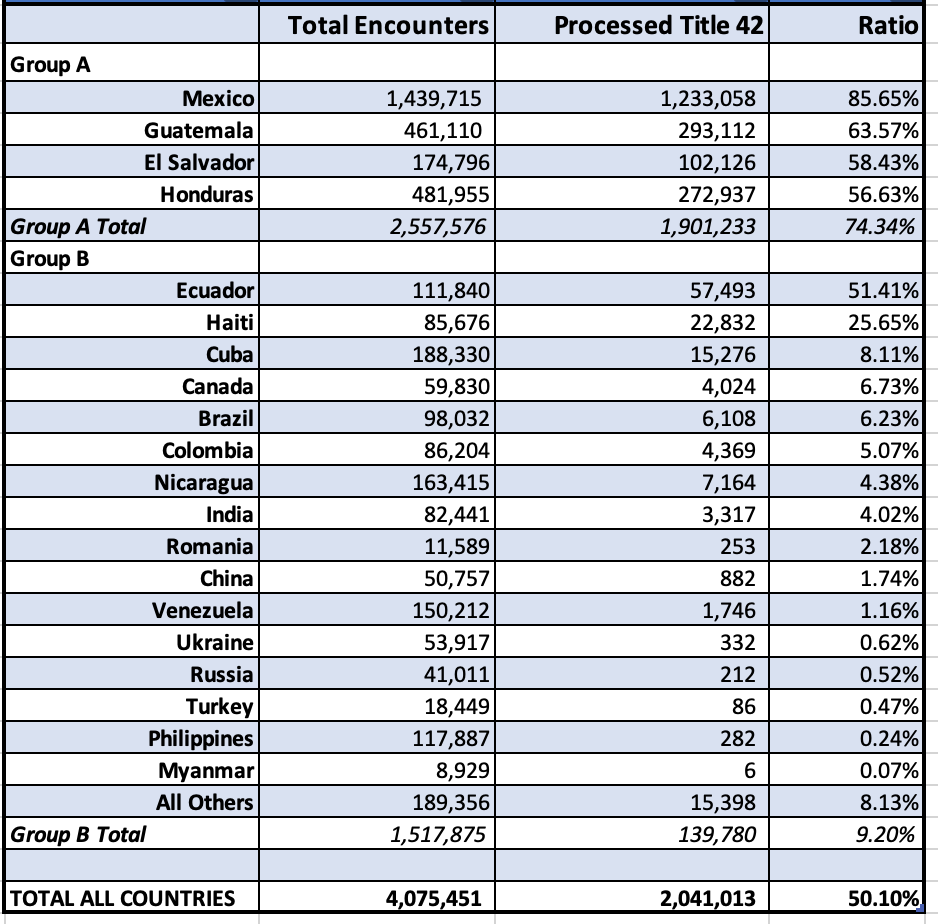Haitian migrants were expelled at much higher rates than the nationals of other countries similarly situated during the twenty-seven months since Title 42 policies were first implemented. Haitians were at least 3X more likely to be expelled compared to nationals of almost all other countries, except for those who could, by agreement between the United States and Mexico, be expelled directly into Mexico. This pattern changed in June of this year, with a significant drop in the percentage of Haitians encountered being expelled, a trend that seems to be continuing into July. We are still demanding that all removals be halted immediately.
Title 42 refers to a section of the US code that the Centers for Disease Control and Prevention claimed gave the Trump and Biden administrations the authority to summarily expel, “persons traveling from Canada or Mexico (regardless of their country of origin) who would otherwise be introduced into a congregate setting in a land or coastal Port of Entry (POE) or Border Patrol station at or near the United States borders with Canada or Mexico.” Title 42 was issued as a means to contain COVID-19, but was immediately denounced by public health officials as a backdoor means to end asylum. It has utterly failed as a public health measure.
For Haitians, Title 42 has been the principal means of their expulsion from the United States over the last 27 months. There have been at least 27,500 Haitians removed from the United States since March of 2020; almost all of whom have been expelled since Biden took office. Of these, 22,832, or 83% were removed under Title 42.
To understand the discriminatory impact of Title 42 on Haitian immigrants we have to first look at how Title 42 has been implemented overall. There are two sets of countries whose citizens are treated quite differently. The first set of countries (Group A) are those for whom the Trump administration negotiated an agreement with Mexico to accept those expelled. This group includes Mexican nationals, and people from Guatemala, El Salvador, or Honduras. Expulsions from just these four countries made up 93% of all Title 42 expulsions between March of 2020 and the end of May 2022. [All of the figures in this article were derived using Customs and Border Protection's Database of Nationwide Encounters here]
The citizens of other countries (Group B) could not simply be expelled back to Mexico, though some clearly have been. The main exception is Ecuador. Ecuadorans made up over 50,000 Title 42 expulsions in 2021, with at most 10,000 returned to Ecuador by plane that year. The rest seem to have been expelled back to Mexico, or simply denied admission to the United States at a port of entry.
For other countries, because of the cost and logistical challenges associated with detaining and flying them to their home countries, Border Patrol/DHS processed them under Title 8 authority, or “regular” immigation processing.
The difference between Group A and Group B is stark. For all of the countries in Group A, 74% of those encountered have been expelled under Title 42. For Group B, only 9.2% of those encountered have been expelled under Title 42. The two exceptions are Ecuador, a unique situation discussed above, and Haiti.
The percentage of Haitians expelled in relation to encounters between March of 2020 and May 2022 is 26.6%, the highest in Group B aside from Ecuador. Haitians represent only 5.8% of all Border Patrol encounters in Group B, but they make up 16% of the Group B expulsions under Title 42.
Table 1: Encounters and Title 42 Expulsions All Countries March 2020 to May 2022

Further, while the ratio of expulsions to total encounters has declined overall since Biden took office, during the last year, the ratio has actually gone up for Haitians. During FY 2021 just over 20% of those Haitians encountered by US border patrol were expelled under Title 42. In the current fiscal year (2022) the ratio of Title 42 expulsions to encounters has reached 34.3%.
If we use the debacle in Del Rio as a dividing line, the ratio of encounters to expulsions has basically doubled for Haitians since September of 2021. This is a clear indication of the Biden administration's deterrence strategy, intended to discourage more people from Haiti from trying to enter the United States.
It is important to note that the figures above are all derived from Border Patrol official statistics. What is not known is how many Haitians have been expelled by the US Border Patrol to Mexico. We know this has happened, and until Del Rio, as far as such expulsions could be tracked, it was as a small number. However, during the Del Rio crisis, Mayorkas claimed that “about” 8,000 Haitians “voluntarily” returned to Mexico. These Haitians were not processed, and are not included in official counts. Was it actually 8,000, or more? We don't know. The point, however, is that the number of Haitians expelled is likely considerably higher than these official statistics represent.
Turning the corner in June?
The data above was compiled for a report on discrimination against Haitians in US border policy before June 2022 numbers were publicly available. The June numbers have now been released, and the trends identified above do not apply. There were 4,198 encounters of Haitian nationals by the US Border Patrol in June. Only twenty-nine (or 0.69%) of them were processed under Title 42. As far as we can tell, there have been no Title 42 expulsion flights to Haiti since June 3, though smaller “regular” deportation flights have occurred in the weeks since.
There has been no official policy announcement from the Biden administration on Title 42 and Haiti. However, a federal court ruling now requires baseline screening be made available to those who express fear their lives may be in danger if returned to their home country, or expelled to a third country. The ruling went into effect at the end of May, and the number of Title 42 expulsions for Haitians has dropped radically since. There were still 95,000 Title 42 expulsions overall in June; 91,000 (96%) of them to the Group A countries noted above.
The apparent pause in Title 42 expulsions to Haiti is welcome news. However, we remain concerned that Title 42 expulsions will increase again absent a public commitment to end them. Any removal to Haiti right now is placing lives at risk. Though the number of removals has declined dramatically with the current decline in Title 42 expulsions, it is no less wrong to remove any of those currently being deported.
You can join our petition to end ALL removals to Haiti here.


